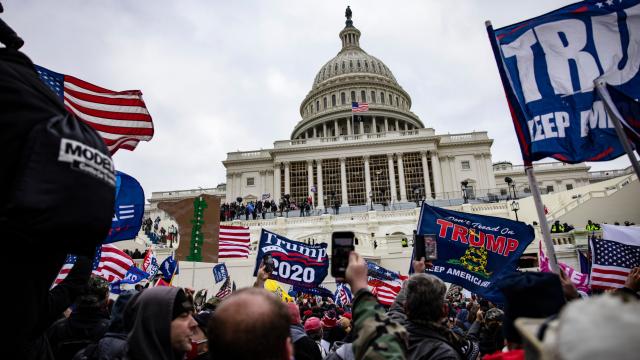Clearview AI’s controversial facial-recognition app has seen a spike in use as police track down the pro-Trump insurgents who descended on the Capitol on Wednesday. With so many of those idiots snapping selfies and livestreaming the raid as if it was a school field trip, I’m surprised police even needed the help.
First reported by the New York Times, Clearview AI CEO Hoan Ton-That confirmed to Gizmodo that the app saw a 26% jump in search volume on Jan. 7 compared to its usual weekday averages. Given the aforementioned treasure trove of potential evidence documenting the attack — from live cable news broadcasts to hundreds of images and videos — the Federal Bureau of Investigation and Washington, D.C. police have called for the public’s help in identifying participants. Roughly 2,400 polices agencies nationwide have contracts to use Clearview’s facial recognition software, according to the company, and several of them have reportedly been turning to it to assist federal investigators.
Detectives at the Miami Police Department are using Clearview’s tech to identify rioters in images and videos of the attack and forwarding suspect leads to the FBI, per the Times. Earlier this week, the Wall Street Journal reported that an Alabama police department was also employing Clearview’s tech to ID faces in footage and sending potential matches along to federal investigators.
“We are poring over whatever images or videos are available from whatever sites we can get our hands on,” said Armando Aguilar, the assistant chief of Miami Police and head of the department’s investigations arm, in an interview with the Times.
A Clearview spokesperson did not immediately respond to Gizmodo’s inquiry about whether usage data fluctuated on any other days since the insurgency.
Of course, even when arguably used for good in cases like this, that doesn’t make Clearview’s tech any less of a privacy nightmare. Other facial recognition tools used by police rely on databases of government-provided photos, i.e. driver’s licence photos and mug shots. However, Clearview has said its database uses some 3 billion images scraped from social media sites and other public servers, a quasi-legal practice that’s straight out of dystopian fiction and has come under fire from civil liberties activists who argue that the data is gathered without the consent of the people being profiled.
As a result, the company’s currently fighting legal battles on multiple fronts. Clearview suspended operations in Canada after the federal Office of the Privacy Commissioner of Canada opened an investigation into whether the company violated the country’s laws protecting personal information online. The state attorney general of Vermont filed a lawsuit against the company alleging violations of multiple state laws. Tech giants like Twitter and Google have sent Clearview cease-and-desist notices to keep them from scraping data from their platforms.
Some police departments have banned officers from using third-party facial recognition software altogether. And honestly, that’s for the best given the host of current problems with facial recognition technology in general, which include often being wildly inaccurate and misidentifying people of colour.
